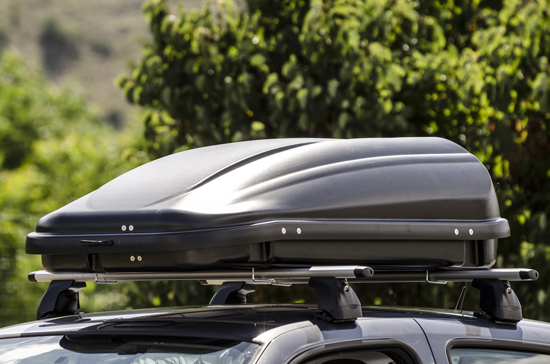|
Enjoy a comfortable and clutter-free ride to the campsite, the cottage, or a sporting tournament with a rooftop cargo carrier that keeps your belongings securely on top of your vehicle. Even better, there are cargo carriers available for just about every purpose and every budget. Just make sure you consider a few key factors while you shop: compatibility with your vehicle, cargo type, and carrier type.
Compatibility
Before purchasing any rooftop cargo carrier, check that it is compatible with your vehicle. Many cargo carriers need to attach to a roof rack with crossbars, which are more likely to be found on crossovers, SUVs, and other larger vehicles. If you don’t have a roof rack, you may have to purchase and install one first. Alternatively, there are also some cargo carriers available for a “naked roof” that can be installed without a rooftop rack.
As you start researching different cargo carriers, consult your vehicle’s owner’s manual for information such as compatible roof racks and potential weight limits. You’ll narrow down your cargo options and stay safer on the road.

Cargo Type
The type of cargo you need to pack will also determine the type of rooftop cargo carrier best suited for your purposes. Whether you need it for a camping trip, a fishing excursion, or a sports event will change the type and size of equipment you are going to bring. Make sure that the size of your cargo carrier can fit everything you have to pack and consider the different dimensions that are available as well.
Even if you are currently only looking for one specific use, such as a road trip, think about whether you might use your cargo carrier for other reasons when you have it. Once again, be sure to also consult your vehicle’s owner’s manual to ensure you can safely haul the weight of all your gear.
Soft Vs. Hard Carriers
There are two main types of rooftop cargo carriers: soft and hard. Soft cargo carriers are made of malleable and lightweight materials, akin to a duffel bag. Hard cargo carriers have a rigid exterior made of tough and durable plastic. Both have their own unique pros and cons depending on your situation.
Hard cargo carriers are more common because they provide extra security and protection for your belongings. They are more aerodynamic, come with a lock, and can stand up to severe weather and highway debris. They also tend to be the far more spacious option. Soft carriers, on the other hand, offer an affordable and flexible solution for carrying your cargo and can be quickly and easily stowed away when not being used. Plus, they can be installed on vehicles that don’t have a roof rack.
You can’t beat the convenience of a rooftop cargo carrier, especially when you take the time to choose the best one. No more stuffing your trunk or backseat to the brim–travel easy by keeping your gear up high.
|